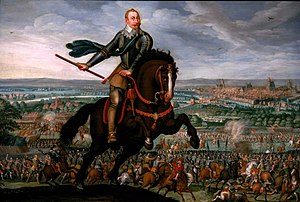Battle of Breitenfeld (1631)
| First Battle of Breitenfeld | |||||||
|---|---|---|---|---|---|---|---|
| Part of the Thirty Years' War | |||||||
 Gustavus Adolphus in the battle of Breitenfeld |
|||||||
|
|||||||
| Belligerents | |||||||
|
|
|
||||||
| Commanders and leaders | |||||||
|
|
Friedrich Egon VII |
||||||
| Strength | |||||||
|
23,000 Swedes 11,319 Musketeers 4,812 Pikemen 3,928 officers 8,700 horse 28,750 Swedes and Saxons at Breitenfield |
35,000 men | ||||||
| Casualties and losses | |||||||
|
5,550: 3,550 Swedes dead 2,000 Saxons dead |
27,000: 7,600 dead 6,000 captured 3,000 wounded 4,000 deserted 3,400 missing 3,000 more captured on September 19 by the pursuit at Merseburg |
||||||
23,000 Swedes
18,300 Saxons
11,319 Musketeers 4,812 Pikemen 3,928 officers 8,700 horse
The Battle of Breitenfeld (German: Schlacht bei Breitenfeld; Swedish: Slaget vid Breitenfeld) or First Battle of Breitenfeld (in older texts sometimes known as Battle of Leipzig), was fought at a crossroads near Breitenfeld approximately five miles north-west of the walled city of Leipzig on September 17 (Gregorian calendar), or September 7 (Julian calendar, in wide use at the time), 1631. It was the Protestants’ first major victory of the Thirty Years War.
The victory confirmed Sweden’s Gustavus Adolphus of the House of Vasa as a great tactical leader and induced many Protestant German states to ally with Sweden against the German Catholic League, led by Maximilian I, Elector of Bavaria, and the Holy Roman Emperor Ferdinand II.
The Swedish phase of the Thirty Years War began when Gustavus Adolphus and his force of 13,000 landed at Peenemünde in 1630. Initially, Sweden’s entrance into the war was considered a minor annoyance to the Catholic League and its allies; his only battles to this point had been inconclusive ones, or fought against generals of modest military ability. Consequently, the Imperial Commander of the German Catholic League, Tilly, did not immediately respond to the arrival of the Swedes, being engaged in northern Italy. However, the effective end of the Mantuan War in 1631 ensured that the large Imperial army previously tied up there was now free to move into the German states.
...
Wikipedia
